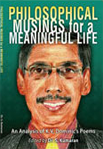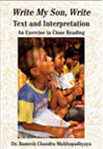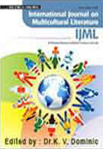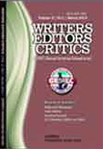Details of Critical study
Interview with Dr.Stephen Gill
Year Of Publish:
Interview with Dr. Stephen Gill
Â
KVD: Sir, I have gone through all the interviews with you. You have expressed your views on almost all aspects of your writings, your philosophies, your view of life etc. I have now come with some fresh questions which have not been asked by others. Let me start with the relevance of literature on modern man’s life.
KVD:  How is literature appealing and attractive in this cyber world of ‘sick hurry’ where vast majority are struggling hard for existence and the very few elite bourgeois running crazily after wealth?
SG: Literature is a body of written works. I will divide literature into literature for knowledge and literature for aesthetic pleasure. Literature for knowledge includes guides, calendars, how-to and health books. I am sure you are not alluding to this type of literature in your question, although demand for this type of literature has increased in the Cyber Age.
Art is the main objective in the creative literature which is mainly for aesthetic pleasure though it may carry elements of knowledge. Â Â Creative literature, more imaginative, Â Â Â has its origin in the early devotional hymns to gods and goddesses or nature to please them to avert disasters. Â Struggle for existence and to avoid disaster has always been the destiny of human. This fight between human and human, and human beings and nature has been steadily on the increase. It is present in the digital era also, though the shape of this struggle keeps changing.
In the early days, most writers of creative literature were from the elite class including landlords who had leisure to read and write. Â They enjoyed good stories from their own ruling groups. Â When education became universal, another class started emerging. The have-nots began to read and write. They began to take material from their people. Â Â With the advent of the printing press a new era emerged that was a challenge to literature, but this creative literature survived and progressed, assuming different dimensions. Another challenge to creative literature was posed by radio. It still survived, though it shaped new avenues. Â Then came TV and now is the Cyber Age.
Email and other modes of communication in the Cyber Age is a fresh challenge. But the creative literature is not going to die.  There will always be readers who would like a good story and poem. There are people who read books in bed. There are going to be more experimentation in the form of creative arts, but there will always be people who have leisure to read. I believe that in spite of hard life and strife, literature will flourish in the Cyber Age. Those who want to make money will have a busy life and those who have money or just want to create and read will also flourish because of the welfare systems by the governments and patronage by the large corporations who instead of paying taxes will divert a part of their income to help artists. As long as there are writers and poets, there will be a market for their works. In the most competitive world, there are regimes that have and will introduce welfare systems to help the needy.  In olden days, writers and poets had their Patrons. This role has been taken over by the states, who will continue patronizing arts and literature. With the average age on the increase, there will be also more people with leisure who would like to produce and enjoy creative literature.
KVD: Hasn’t man lost the aesthetic and moral sense by the advent of TV, Computer, Internet and Mobile Phones?
Â
SG:Â Humans enjoy the experience of beauty and art through aesthetic senses. Aesthetics is the appreciation of beauty and it is opposed to what is purely intellectual.
Different forms of communication, including phones, internet, computer and TV, are used to give knowledge, but their physical aspects can be aesthetic or may satisfy the sense of beauty. It seems the question is to suggest that persons are more engrossed in digital media than in books of creative literature that give aesthetic pleasure.
There is no proper study done so far to confirm that the advent of digital technology has suppressed the moral and aesthetic pleasure, though it appears to be like this. It is because of greed. Business and industry which are driven by the greed for money have overtaken this media for materialistic gains. But there is nothing wrong with these inventions. It is their misuse by a powerful section of society.
KVD:Â Has the electronic capitalism affected the print capitalism?
Â
SG:  Not yet fully. There are some signs, but it cannot be confirmed fully. It may be just a fad. There is no doubt that print media is shrinking.  How much it will shrink is anyone’s guess.  We have to wait and see. I feel that it will take time for the print media to adjust to the changing situation. The world is on the crossroad of change as it was when the technology of print was invented. How far this will go is to be seen. I have heard that certain book publishers have reduced the number of copies of their first print run. I have also heard that e-books are becoming popular and several publishers buy the digital rights from authors, although they give higher royalties on e-books than they give on regular printed books.
KVD: Don’t today’s people prefer short pieces of writings like poems, short stories etc. to long novels.
SG:Â It appears to be like this, but it is not so in practice at least not in North America. A reader will find long novels of three hundred pages displayed proudly and fetching prizes. Life in the West is busy, but there is also more leisure in the West than India has. Â Whereas citizens in India and developing nations have to struggle for their basic needs, the citizens in North America struggle for their luxuries. Those who are unemployed receive some help from governments to buy their basic needs. Â Visitors will often see travelers in trains and buses, even sitting on benches in parks in summer, reading books. The West has more time than the East has. Whenever I am in India, I can do only one or two works in a day. People can go to the post office and a bank at the most and the whole day is done. On the other hand, in Canada, I can do five to six types of work in a single day. And still, I have time to rest, and do my writing.
Because people have time and money, they can buy books and read long novels. Canada has also several poets. There is no doubt that to write a short piece, such as a poem, does not need much time. One can finish reading the whole book in a couple of hours, if not in minutes. Because of the availability of time, novelists in the West are producing long fiction. I have heard that some publishers will not even touch a manuscript if it is not long.
KVD:Â What difference do you find in the reading habits of Indians, Canadians and the rest of the world?
Â
SG:Â Â Most young people in India will read notes to pass examinations. They read mainly those books which are prescribed in their courses. Newspapers in India are common and published in tons. Most of them are national, publishing local editions at the same time from
several cities. It may be that people in India read newspapers more for lack of other channels for diversion. Â This is the cheapest media.
Canada has mostly local newspapers. Â People do buy and read books because of availability of time and money. Some countries are book readers more than others. Britain is a nation of readers.
KVD:Â Do you feel any identity crisis? Do you like to be branded an Indian, Canadian or a World Citizen?
SG:Â I am a Canadian by choice, an Indian by birth, and a world citizen in my outlook. I would like to be considered a human with the weaknesses and strengths of any human. Â People all over the world have the same fears, concerns and basic problems. In a way, I am an outsider for Canadians as well as for Indians. But that does not bother me as long as I am in Canada. It hurts me more when I am in India. Indians take me as an Indian, forgetting that I have lived outside of India more than I have lived in India. This hurt was apparent in my visit to India in November 2008.
It was really cold in Delhi and around that area. I stayed with my niece. When I went to the washroom, I was told that the servant had put the Geezer on and I could take a bath. I saw a shower at the top, and turned on the tap. But there was no water. I was getting late for the conference. I had a shower in cold water.
Then I went to the conference where I was invited to speak. In the morning, I was told by the person who was also put in the same room that the warm water was on. Again the same problem. I took my bath in cold water. Due to this and other factors, I became sick.
I was to be honored at another place. I stayed with a bishop. I was sure that the bishop’s house must be up- to- date and it was. In the morning, I went in and turned the tap on to have a shower because like in other places this place also had a shower outlet. Again the same problem. After a few days, I went back to stay with my niece. By this time, I was really sick. Nearly every night I shivered with fever. I started taking medicines.
I went for a bath in the morning. The servant told me that the Geezer was on. This time the servant told me to wait for at least fifteen minutes for the water to warm up. There were also guests of Indian origin from Australia at the house of my other niece. A young girl told me that the water should be stored in a bucket and than mix it with cold water to take bath. That is why nearly every house had a bucket in the washroom.
No one told me that showers did not work and buckets had to be used to store warm water and mix with the cold water. Everybody thought that because I was born in India, I knew all this. That is how I suffered in my 2009 visit to India.
I feel quite at ease with both cultures, although I find it difficult to understand the Indian mind when it comes to business deals. Indian businesses do not issue any invoice and do not have any written agreements. There are several such stories about India.
KVD:Â What are your views on religion? Do they actually serve the laity or exploit them?
Â
SG:  Any religion that preaches hatred promotes disunity and chaos. Before going deeper, I would like to say that religion defines relations between humans and their Supreme Creator. I believe that the word religion is from Latin word “religare†that means to connect or tie. Therefore, religion refers to a set of beliefs and practices which connect humans to their Supreme Creator.
Like anyone else, I see that Supreme Creator send his rains, and sun for everyone, including the sinner and non-sinner. This is the evidence of the fact that the Creator is love and peace. Religions should be representatives of the love and peace of the Supreme Creator on earth.
Love and peace is beauty and this beauty is everywhere. If the religion of any person teaches that the world is a miserable place and is not worth loving that religion denies the gift of life that is from the Supreme Creator. A religion that develops more attachment to the world after death may not contribute anything useful to the world. That religion has the possibility of developing the idea of even killing innocent persons to enter the paradise on one or a pretext. Such a person would like to enter that imaginary world of beauty on the bones of innocent people. That must be a religion of hatred and the Supreme Creator, God, is not for hatred.
A follower of any religion who loves the world and because of this love tries to make the world a better garden of beauties should not worry about his or her life after death. Such a person is carrying the torch of the Creator on earth. Â I am positive that Creator will not forget that faithful follower of His. This person follows the religion of God as His child. To me religion teaches peace.
A person who carries the torch of love in his own way to make the world a better place to live is a child of God, even if that person does not believe in the existence of any divine being. Such persons are far better than the person who believes in a divine being and instead of making the world a better place destroys its beauties and turns the world into a hell by spreading fear and misery around
Where there is discrimination based on caste, color or creed, there is no shower of peace. That dry land grows thorns of misery and poverty and sicknesses of all kinds.
To say that religion stand in the way of human progress is not entirely correct. Several religious organizations are engaged in developmental works. It is a misunderstanding of the nature of religion that has been causing destruction in the world. Some shrewd leaders have and still are exploiting religion for their political ends. They use the services of misguided religious leaders to kill humans to spread fear. They prepare young minds by giving a wrong interpretation of religious books to kill themselves and others to enter the blissful abode of God. Such persons are for exploitation. They exploit language, culture and every possible mean to advance their goal.
There are two main steps to avoid this exploitation of the laity. One step is to separate the state from religion, because religion is a personal matter, and the state is to take care of all its citizens. A mixture of the state and religion will certainly lead to exploitation of religion by political persons for political agendas. It is not the fault of any religion or any culture or language. It is fault in the political and educational systems.
The regimes and groups which use these tactics of mixing religion and politics should be censored. A question is who is going to sensor them. Every nation is sovereign and can carry on anything for their greed. For that the world needs a United Nations Organization for Religion or a parliament of the world. I would like to quote a few lines from the Author’s Preface to Shrine, a collection of my poems, where I wrote in 1999:
There are regimes on our planet today which are producing religious robots, ready to kill and be killed for a quick passport to Heaven. To counter these robots, regimes of slightly different faith, are also producing robots. There does not seem to be an ending to their productions. With all the sophisticated technology, the world would be in a much worse situation than it was during the days of the Crusaders in the Middle Ages if nothing is done to lock the doors of these laboratories and factories. One right step to look into this problem closely is the establishment of a strong United Religions Organization, along the lines of the UNO.
KVD: Since terrorists are often driven by religious frenzy, don’t you think that a world without religion is the need of the day to save it from destruction?
Â
SG:  There are political elements that exploit religion for their own interests. Terrorists fall victim to them. These exploiters and terrorists are in a small minority. To do away with the strength that has and still is contributing to the amelioration of society for the sake of this microscopic minority  is not a wise step.  Moreover, it is not possible to have a world without religion. Even those who do not have religion develop their own religion without a set of dogmas.
I believe that humans need a religion in one shape or the other. It starts from childhood, when a child feels comfortable in an atmosphere that is caring and in the parents who are stronger than he or she is. Probably father appears to be the strongest and the bravest person in the world. It begins to dawn in adulthood that father is not the strongest and the bravest in the world. The adult keeps looking for another figure, focusing on a super power. The image of God fills the gap. No matter at what stage of development a human is, there will always remain a need for a father or mother figure.
Also, there is a psychological need for a reliable source where a person can  go with problems. Most people need a patient silent listener. One way is to go to a psychiatrist   or a councilor for guidance. Most of the time merely  expression of the problem lightens the burden. For such persons,  God fills the need of a councilor.
Then there are people who believe in miracles. This belief is the outcome of one’s religious faith. There are even prominent scientists who believe in miracles. I know a strong organization of medical doctors who have witnessed miracles in their profession and believe in healing through prayers. They have a truck load of cases to prove their belief.
From a practical point of view,  the superpower emerges as the most loving and caring embodiment of peace. A human who does not believe in an organized religion, but believes in peace and love is religious to me.  What are important for me are peace and the use of peaceful means to create peace, because without peace there is no prosperity and health of any kind. It does not matter to me whether an individual believes in a superpower or not. A belief in peace and the use of peaceful  means are the main points in my way of thinking.
Every religion has the possibility of indulging in corruption, though some may have more possibilities than others. Â At the same time, every religion has the capacity to overcome that corruption. I believe that in spite of corruption religion is still the rock of hope.
KVD:Â Do you think that religious leaders, if willing, can convert the terrorists to doves?
Â
SG: Misguided religious leaders  turn the doves into vultures. Any expectation from them to do the other way around is to expect flowers from the dry sand. Those religious leaders   do not know their brand of religion. This wrong can be corrected through constitutional measures, but lawmakers  do not interfere thinking of their priorities. Their main priority is the safety and welfare of the citizens of their own nation. When they deal with religious leaders  who exploit citizens in the name of religion, their priority does not change. In many cases, national politicians use these religious leaders for the promotion of their agenda. They are able to do it because there is no authority above them to control their actions. That is where the problem starts.
We are in a global village, but this global village  does not have  its mayor and councilors. This global village is a house divided. It is a ship that is being pushed in  different directions by different navigators because of the lack of a single compass. This global village is like a mansion built or being built by divergent  builders with their own individual designs in mind.
The global village now needs a global organization along the lines of the UN, something like United Nations Religion to guide and control religious leaders, so that they may work for the peace and security of the world.
KVD: Do you prefer to narrow your belief to Christ and Christianity or broadly to God and his creation—man, animals, plants and universe?
Â
SG: My belief in Christ, God and God’s creation refers to the same one belief.  To me God is love and peace. It is evident from his rains, sun and other objects. He does not differentiate between sinners and no sinners, religious and irreligious beings. His gifts are for all. In other words, God’s love is unconditional.
As manifested in the Gospels, the love of Christ is also unconditional. Christ is the incarnation of the love of God. God manifests Himself in the objects of His creations, including, human, nature and animals. Therefore to love them is to love God, as well as Christ because Christ is the incarnation of God’s love.
KVD:Â Is it possible to have an amalgamation of all religions as to make a world religion?
Â
SG: Amalgamation is not possible because different religions have developed their own history and have waged brutal wars with the followers of other religions. This bloodshed and differences  in their laws stand in the way of their unity. For instance, Islam stresses  the observance of strict laws of  daily payer at  five times, and observance of forty days of fasting in the month of  Ramadan, and a  holy pilgrimage to  Mecca at least once in the life time. Islam  also has  several other laws pertaining to diet and cleanliness. They all are a must for every faithful Moslem to observe.
On the contrary, Christ stressed only one law and that is love without any condition. Both Christianity and Hindu religion consider that God is peace. The word Om in Sanskrit clearly defines the attributes of God when it says OM shanty shanty shanty Om. The same Om is Omega in Latin that has been used in the Bible for God. Both have the same meanings. Both Hinduism and Christianity are flexible and preach non-violence. The Buddhist principles are akin to the ten commandments which were received by Moses from God. Actually both Moses and the Buddha were contemporary. Hinduism, Buddhism and Christianity can be easily amalgamated and I am sure it would have been amalgamated by now if Christianity had been presented to India in the Indian way, not in the Western way. In any case, this needs much longer discussion.  I am just touching the bases  here.
When you talk of amalgamation probably you refer to the selection of good points of every religion to incorporate into one. Even this is not possible. There have been attempts  to select good point from top religions to invent a new religion, but so far all such attempts  have failed. From the early attempts,  there was one from Emperor Akbar who invented Deen-e-Elahi or the Religion of God. Only two or three persons followed it. There have been attempts  lately in India to follow the basic principal of every religion that is love. But their  followers remain mostly Indians in India and abroad.
The problem is that everyone thinks that his or her religion is the best. It is because of their religious leaders and lack of education and proper study of all religions. Â Instead of amalgamation, the episodes relating to brutalities and hatred should be taken away from every religion. Then these religions without the elements of hatred and brutalities should be taught in every school right from grade one to high school. This may promote tolerance and understanding among the followers of all religions.
In addition, there should be a United Religions Organization, along the lines of the United Nations Organization or at least the League of Religions, along the lines of League of Nations.
KVD:Â Do you believe that your poems can soften the minds of religious mafia, political mafia and intellectual mafia who rule and dictate this world?
Â
SG:  Nothing can soften the minds of mafia because they live in the atmosphere of a different culture. But they can  be influenced by people around them. Students of today are going to be among those people. Readers will pause and think after reading my poems. In order to have a better and tolerant world, my poems, particularly the Flame, deserve to be studied  at school, college and university levels. These creative works generate healthy discussions among students. They are  likely to think about terrorism and other forms of social cancers.  The first stage to heal this cancer  is the stage of thinking. The laboratory of terrorism is in the mind. That should be the main focus of the physicians  who want to eradicate terrorism.
KVD:You have dealt with the cause of terrorism and world peace magnificently and exceptionally beautiful in Shrine and The Flame. I think other beings, plants and Nature need
your help for their survival. Can’t your pen write for them and dissuade your fellowmen from exterminating and uprooting them?
Â
SG:  I believe that humans must live in harmony with the kingdom of the plants and animals. Human beings, animals, plants and nature need one another for survival. I borrow most of my symbols from nature and have written some poems  about them. I have not been able to write much about nature for lack of time. After completing a few projects, I want to concentrate on nature to prove that survival of humans much depends on the survival of nature.
KVD:Â What are your views on Indian English Literature?
Â
SG: Several Indian English writers suffer because of the lack of resources to learn  the writing skills.  Genius is there and so is ambition. But just genius and ambition are not sufficient in the competitive world of writers across the globe. Knowledge of the tools and their proper use are equally important. To fill this gap, I advocate that Indian colleges and universities should create the positions of poets and writers-in residence. They can be appointed from six months to one year term. Indian English Literature is going to be a main force in the commonwealth literature. Overseas writers of Indian origin are certainly going to play major roles.
KVD:  And finally, what is your advice to minor writers?
Â
SG: Writers should not be afraid of revisions. They should join groups of writers to associate with them to receive encouragement and ideas to shape up their writings better. Just writing or a desire to write is not enough. In order to produce good work, beginning or minor writers should read the works of prominent contemporary writers and keep trying to find out why they have achieved prominence.  They should read material on the craft of writing and ask other writers about their problems.   Writings, reading and sending works for publishing should never stop.  Every successful writer was a beginner first.  They worked and worked for days and nights to be successful. That is what every beginner or minor writer should be doing. Work, work and work and keep sending to get published, no matter where. I would like to stress again that  it is hard to be a good writer or poet without being a good reader.





